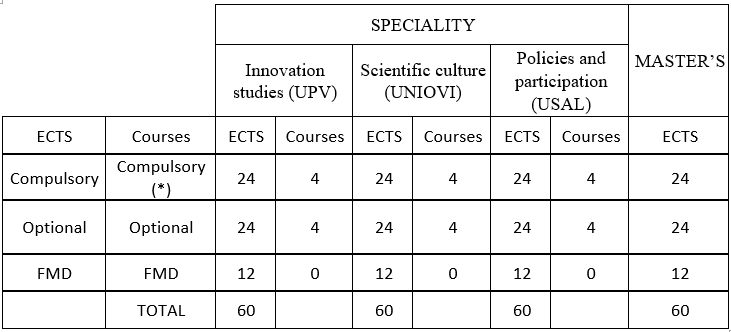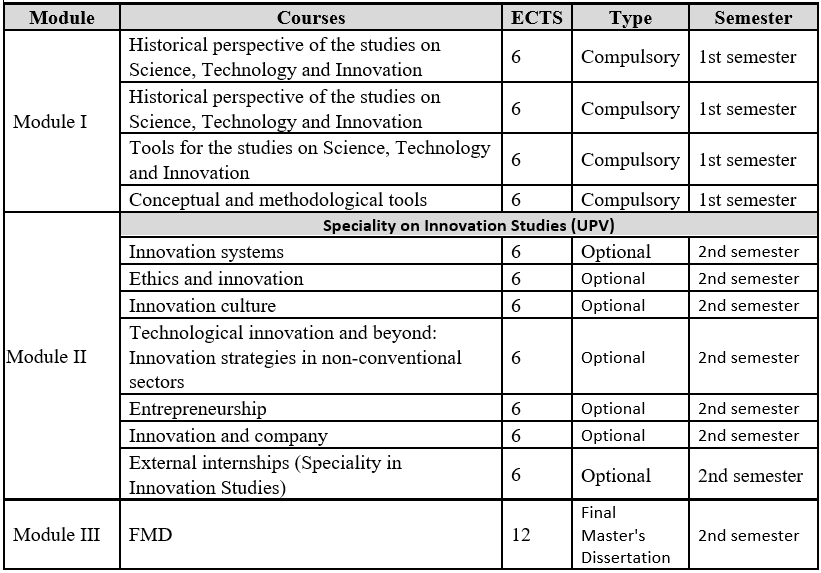 Vera (València) Campus, Universitat Politècnica de València
Vera (València) Campus, Universitat Politècnica de València
Master's Degree in Science, Technology and Innovation Studies
60 credits
Credit 21,84 €
(2024/2025)
25 openings
(2024/2025)
Introduction
Science, Technology and Innovation are key factors in the economic and cultural development of today's society.
The Master's Degree in Science, Technology and Innovation Studies is an inter-university master's degree taught at the Universitat Politècnica de València (UPV), the University of Oviedo (UNIOVI) and the University of Salamanca (USAL).
The master's is offered in a 100% virtual format, with synchronous video-conferences and with the possibility of joining doctoral studies at a later stage within the European Higher Education Area in any of the three universities participating in the master's degree.
This master's degree provides updated knowledge of the different scientific, technological and innovative system aspects, as well as the existing mechanisms of interaction with society, the company and other entities of the innovation system.
Objectives
Its goal is the training of experts in scientific and politic culture and citizen participation as well as in responsible science and innovation management, so as to be able to act as mediators between R&D+I systems and society, the business network or the political sphere.
The main objective is that students complete their studies with an updated knowledge of the different aspects of the present science, technology and innovation system, as well as the existing mechanisms of interaction with society and the company.
To this end:
- It will address the general understanding of the social and political dimension of science, technology and innovation, making use of academic research in humanities and social sciences, which shall provide the analysis framework.
- We will study phenomena such as:
-
Scientific culture
-
Innovation culture
-
The social constraints of research
-
Women's secondary presence in science and technology (as well as other traditionally discriminated social groups))
-
The transfer of knowledge to society and the productive sector
-
The promotion of innovation
-
Ethical issues related to contemporary science and technology
-
The citizen participation mechanisms in science and technology
-
Responsible research
-
Social impact and risk policies, among others.
Career opportunities
- Management of R&D projects in companies, departments of Public Administrations and in the tertiary sector (NGOs, cooperatives, MediaLabs)
- Management of innovation in companies and Public Administrations departments
- Communication in scientific and university institutions
- Social mediation in scientific-technological controversies
- Social Entrepreneurs (MediaLabs)
- Business innovation managers
Structure of the Master's Degree
The master's degree consists of 60 credits, of which the first 24 are core subjects to the three specialities and are taught by lecturers from the three universities. The following 24 are the specific credits of the speciality chosen by the student and are taught by the institution's own teaching staff and, finally, 12 credits are assigned to the Final Master's Dissertation (FMD). The 48 teaching credits are taught between October and May, with the rest of the academic year for the completion of the FMD, so that the master's degree can be completed in one academic year. The distribution is as follows:

Structure and courses in the Speciality of Studies on Innovation (Students enrolled at the UPV):

Who is it for?
The master's degree is aimed at students from any university degree or equivalent qualification who wish to develop a professional or research career in subjects related to culture and science and innovation policy from the perspective of the social studies of science.
Admission criteria
Given its wide scope of application and the variety of topics addressed, no specific prior training is required to access this master's degree. The master's has been designed so that all the necessary theoretical and practical knowledge can be acquired, regardless of the student's previous degree.
Students must have access to a computer with internet connection and be able to operate the usual distance learning platforms, as well as basic computer programmes and video-conferencing systems.











